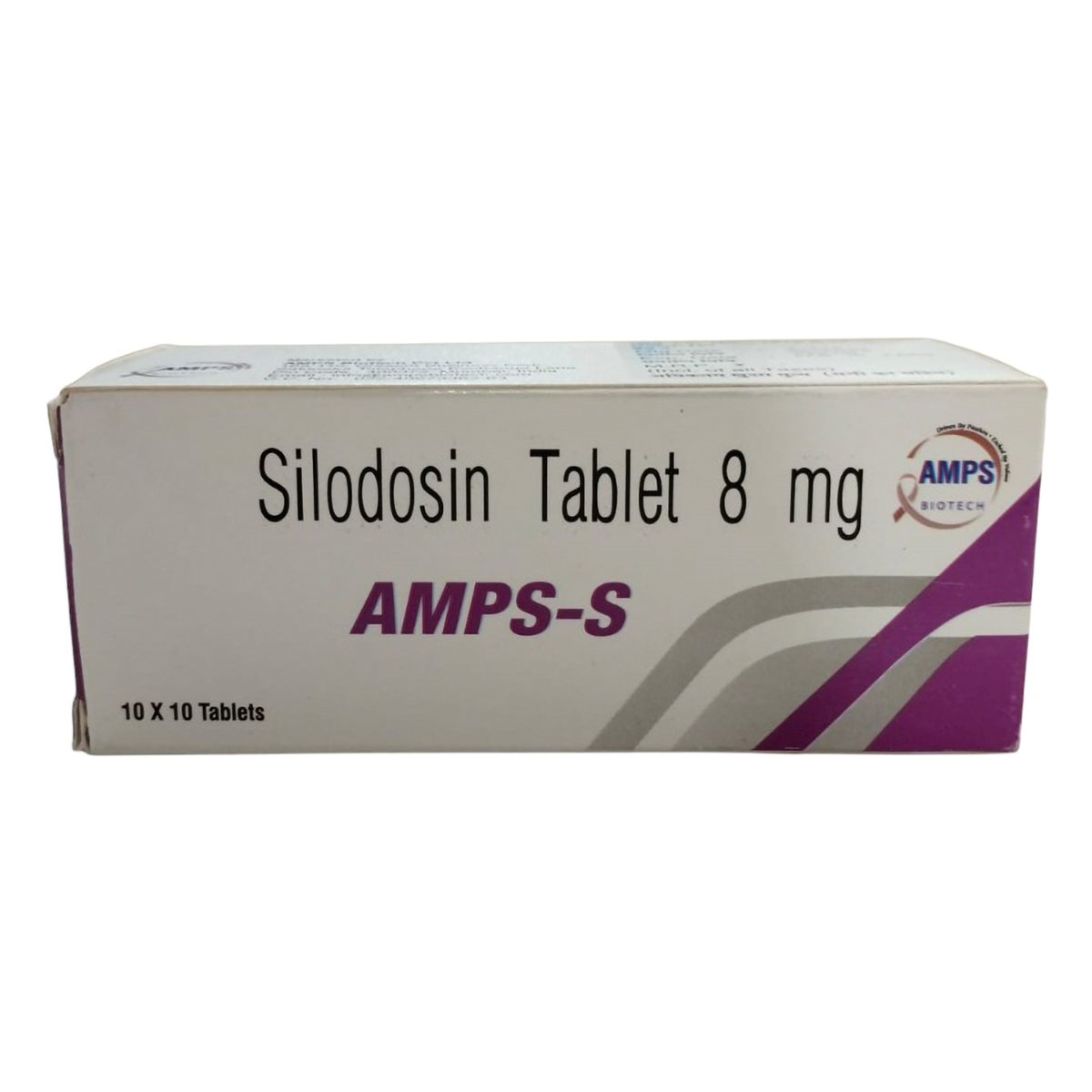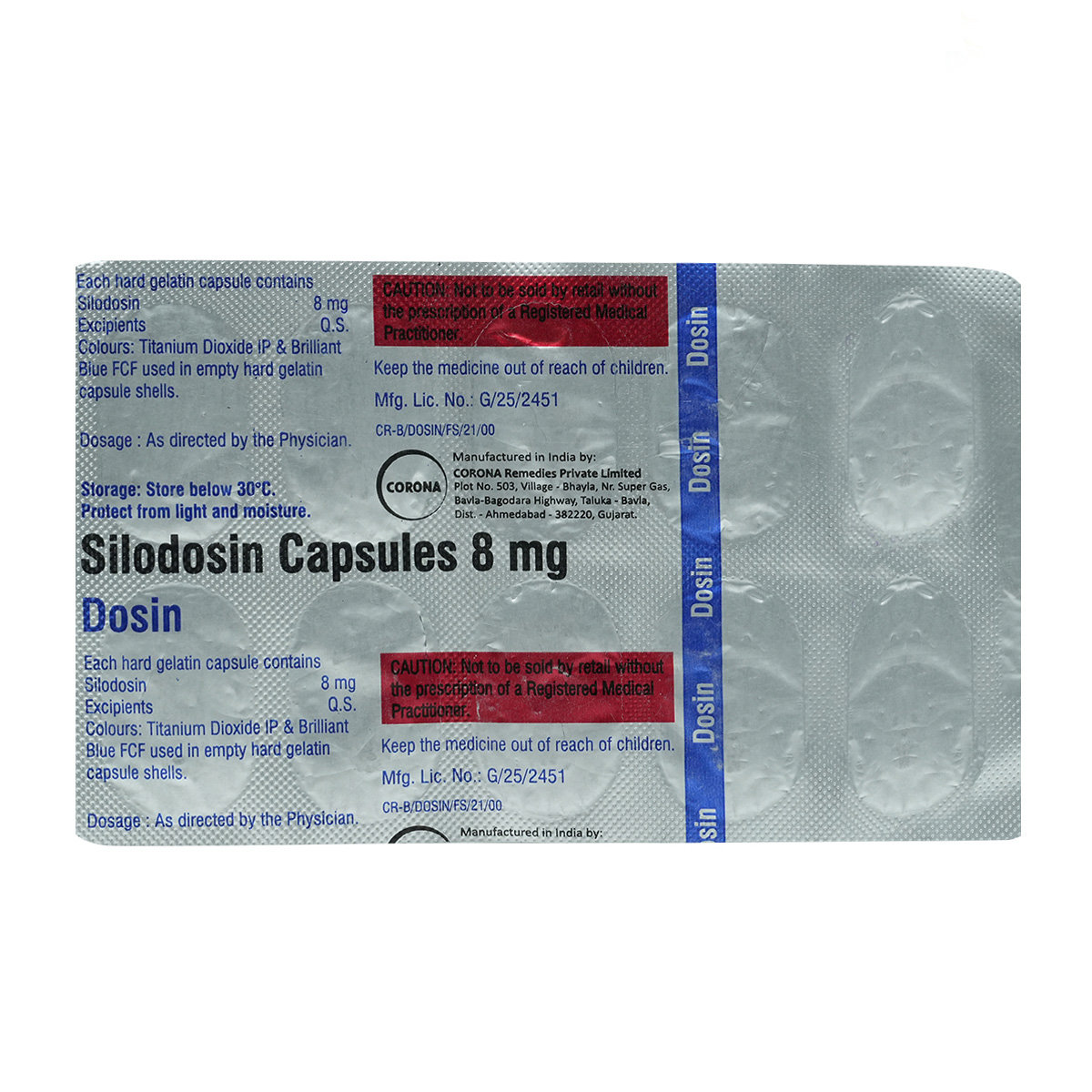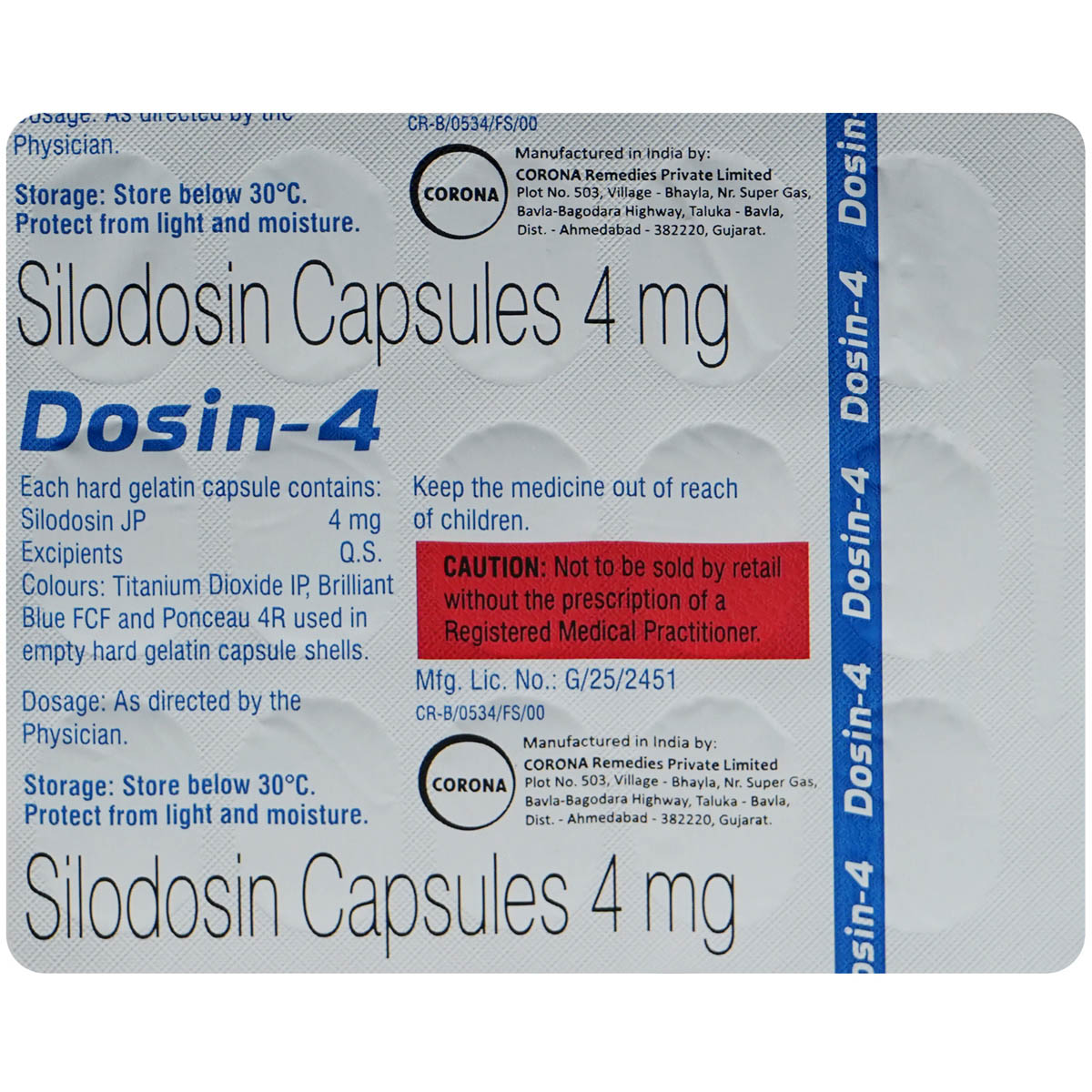Silodosin
About Silodosin
Silodosin is used to treat the symptoms of an enlarged prostate gland (benign prostatic hyperplasia - BPH) in men. Benign prostatic hyperplasia (BPH) is a condition in which there is an enlargement of the prostate gland due to the multiplication of the cells, mostly in men above 50 years of age.
Silodosin contains ‘Silodosin’ that works by blocking the receptors (alpha 1) located in the prostate, bladder and urethra (urine pipe), thereby relaxing the muscles of the bladder and prostate gland.
Silodosin may cause side effects such as dizziness, diarrhoea, stuffy nose, and sudden lowering in blood pressure. Most of these side effects do not require medical attention and will resolve gradually over time. However, you are advised to talk to your doctor if you experience these side effects persistently.
You are advised to take Silodosin for as long as your doctor has prescribed it for you, depending on your medical condition. Take this medication by mouth with or as directed by your doctor. Your physician will decide the dose of the medicine based on the severity of your condition.
Avoid taking Silodosin if you are allergic to it. Inform your doctor if you have low blood pressure or liver or kidney disease. Silodosin is intended for use in men only; women should not take Silodosin, especially pregnant or breastfeeding women. Silodosin should not be given to children as safety and efficacy have not been established. Silodosin may cause dizziness, so drive with caution. Avoid alcohol consumption along with Silodosin as it could lead to increased dizziness.
Uses of Silodosin
Medicinal Benefits
- Silodosin belongs to the group of medicines called alpha-blockers used to treat enlarged prostate (benign prostatic hyperplasia).
- Silodosin helps alleviate the symptoms of benign prostatic hyperplasia, making it easier to pass urine and thereby increasing urine output and flow.
Directions for Use
- Take Silodosin with food or as advised by your doctor.
- It is advised to take Silodosin once daily; however, follow your doctor’s recommendation regarding the dosage and duration.
- Swallow Silodosin as a whole with a glass of water.
- Do not crush, chew, or break it.
Storage
Side Effects of Silodosin
- Ejaculation disorders (orgasm with reduced or no sperm)
- Dizziness
- Diarrhoea
- Stuffy nose (nasal congestion)
- Orthostatic hypotension (sudden lowering in blood pressure leading to dizziness on standing)
Drug Warnings
- Do not take Silodosin if you are allergic to it, any alpha 1 blockers or any of the components in Silodosin.
- Inform your doctor if you have low blood pressure, liver or kidney disease.
- It is advised to talk to your doctor before taking Silodosin if you are undergoing eye surgery (cataract surgery) as cases of intraoperative floppy iris syndrome (IFIS) have been found.
- Silodosin is intended for use in men only; women should not take Silodosin, especially pregnant women or breastfeeding mothers.
- Silodosin should not be given to children as safety and efficacy have not been established.
- Silodosin may cause dizziness, so avoid or limit alcohol consumption and driving, as it could lead to increased dizziness.
- It is always important to check the expiry of the medicine. Discard the medicine if it reaches the expiry date.
Drug Interactions
Drug-Drug Interactions: Silodosin may interact with antifungals (itraconazole, ketoconazole), blood pressure-lowering pills (verapamil, metoprolol, diltiazem), antiviral (ritonavir), immune-suppressing drugs (cyclosporine), antibiotics (clarithromycin, erythromycin), and erectile dysfunction pills (tadalafil, sildenafil).
Drug-Food Interactions: Avoid or limit alcohol consumption along with Silodosin as it could lead to increased dizziness.
Drug-Disease Interactions: Inform your doctor if you have hypotension (low blood pressure), liver impairment and severe kidney impairment.
Drug-Drug Interactions Checker List:
Safety Advice

Alcohol
unsafeYou are recommended to avoid or limit alcohol consumption while taking Silodosin as it may cause increased dizziness.

Pregnancy
not applicableSilodosin is intended for use in men only; women should not take Silodosin, especially pregnant women.

Breast Feeding
not applicableSilodosin is intended for use in men only; women should not take Silodosin, especially breastfeeding women.

Driving
unsafeSilodosin may cause dizziness. Do not drive or operate heavy machinery if you experience dizziness.

Liver
consult your doctorSilodosin should not be used if you have severe liver impairment. Please consult your doctor if you have a liver impairment or any concerns regarding this.

Kidney
consult your doctorDose adjustment may be necessary. Please consult your doctor if you have kidney impairment or any concerns regarding this.

Children
unsafeSilodosin should not be given to children as the safety and efficacy have not been established.
Habit Forming
Diet & Lifestyle Advise
- Urinate as soon as you feel the urge.
- Avoid excess caffeine and alcohol consumption.
- Maintain a healthy diet and exercise regularly.
- Practice kegel exercises to strengthen pelvic muscles.
- Reduce stress levels by doing yoga or meditation. Nervousness can increase the frequency of urination.
Patients Concern
Disease/Condition Glossary
Benign prostatic hyperplasia (BPH): The prostate is a small, muscular gland in the male reproductive system which surrounds the urethra. Benign prostatic hyperplasia is a condition in which there is an enlargement of the prostate gland which occurs due to the multiplication of the cells. This causes the prostate gland to swell, which leads to the squeezing of the urethra and limits the urine flow. The symptoms of benign prostatic hyperplasia include painful urination, difficulty in urination, excess urination, incomplete urination, leakage of urine, dribbling at the end of the urinary stream, and urgency in urination. An enlarged prostate is a normal condition in older men due to changes in male sex hormones.
FAQs
Silodosin is used to treat the symptoms of an enlarged prostate gland (benign prostatic hyperplasia - BPH) in men.
Silodosin works by blocking the receptors (alpha 1) on the prostate gland, bladder and urethra (urine pipe), thereby relaxing the muscles of the bladder and prostate. This helps in relieving the symptoms of benign prostatic hyperplasia and makes it easier to pass urine.
Silodosin may cause dizziness and drowsiness in rare cases. So, drive only if you are alert and avoid driving and operating machinery if you feel dizzy or drowsy.
Silodosin may affect fertility as it causes ejaculation disorders such as retrograde ejaculation (orgasm with less or no semen) and anejaculation (inability to ejaculate semen). However, this is a temporary effect as is reversible on discontinuation of Silodosin. Talk to your doctor if you have any concerns.
Diarrhoea might be a side-effect of Silodosin. Drink lots of fluids and eat non-spicy food if you experience diarrhoea. If you find blood in stools (tarry stools) or if you experience excess diarrhoea, consult your doctor. Do not take anti-diarrheal medicine on your own.
Orthostatic hypotension could be a side-effect of Silodosin. Orthostatic hypotension is a sudden lowering in blood pressure leading to dizziness on standing. If you experience this, do not try to stand up suddenly or start walking, instead lie down and get up slowly only when you feel better. People taking Silodosin are advised to regularly monitor their blood pressure levels to avoid such unpleasant events.
Do not take Silodosin after expiry. Expiry refers to the last date the manufacturer guarantees the potency (strength) of the medicine. Check the expiry date regularly and dispose of the medicine properly post expiry date.
Silodosin causes ejaculation disorders which could result in decreased erectile function. Talk to the doctor if you have any concerns.
No, Silodosin does not cause high blood pressure. In some cases, it might cause low blood pressure leading to dizziness on standing up suddenly.
Let your doctor know if you have had cataract surgery or are due to undergo cataract surgery, as Silodosin may affect the pupil of the eye during cataract surgery. In some cases, intraoperative floppy iris syndrome (IFIS, loss of muscle tone in the iris) has been found.
Silodosin should be taken as prescribed by the doctor. Take Silodosin with a meal at around the same time daily.
It is advised to take Silodosin for as long as your doctor has prescribed it for you, depending on your medical condition.
Silodosin may cause hypotension (low blood pressure), especially during the initial doses. Regularly monitor blood pressure and be cautious while driving or operating machinery.
Silodosin contains Silodosin, which belongs to the group of medicines called alpha-blockers used to treat the symptoms of an enlarged prostate (benign prostatic hyperplasia).
Consult the doctor before taking sildenafil with Silodosin as combining these two medicines can lower the blood pressure and increase the risk of lightheadedness, dizziness, fainting, headache, flushing and nasal congestion.
Side effects of Silodosin include ejaculation disorders (orgasm with reduced or no sperm), dizziness, diarrhoea, stuffy nose (nasal congestion), and orthostatic hypotension (sudden lowering in blood pressure leading to dizziness on standing). Talk to your doctor if any of the side effects persist or worsen.






